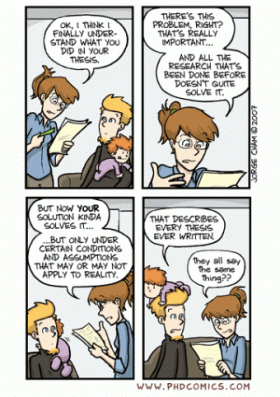From Lars Syll Unlike the old neoclassical theories, game theory concerns strategic interaction between different people. It can encompass things like wage bargaining, fraud and lots of other things that neoclassical equilibrium glosses over or leaves out. And in game theory, free markets full of rational actors can easily, even regularly, lead to inefficient outcomes that require government intervention. Noah Smith/Bloomberg “Free markets full of rational actors.” Sounds great does it not? The problem? In the real world, there is no such thing! Defending mainstream economics against its critics with game theoretical unicorns actually only confirms how justified the critic is. Half a century ago there was widespread hopes game theory would provide a unified theory of social
Topics:
Lars Pålsson Syll considers the following as important: Uncategorized
This could be interesting, too:
tom writes The Ukraine war and Europe’s deepening march of folly
Stavros Mavroudeas writes CfP of Marxist Macroeconomic Modelling workgroup – 18th WAPE Forum, Istanbul August 6-8, 2025
Lars Pålsson Syll writes The pretence-of-knowledge syndrome
Dean Baker writes Crypto and Donald Trump’s strategic baseball card reserve
from Lars Syll
Unlike the old neoclassical theories, game theory concerns strategic interaction between different people. It can encompass things like wage bargaining, fraud and lots of other things that neoclassical equilibrium glosses over or leaves out. And in game theory, free markets full of rational actors can easily, even regularly, lead to inefficient outcomes that require government intervention.
 “Free markets full of rational actors.” Sounds great does it not? The problem? In the real world, there is no such thing! Defending mainstream economics against its critics with game theoretical unicorns actually only confirms how justified the critic is.
“Free markets full of rational actors.” Sounds great does it not? The problem? In the real world, there is no such thing! Defending mainstream economics against its critics with game theoretical unicorns actually only confirms how justified the critic is.
Half a century ago there was widespread hopes game theory would provide a unified theory of social science. Today it has become obvious those hopes did not materialize. This ought to come as no surprise. Reductionist and atomistic models of social interaction — such as those mainstream economics and game theory are founded on — will never deliver sustainable building blocks for a realist and relevant social science. That is also the reason why game theory never will be anything but a footnote in the history of social science.
Heavy use of formalism and mathematics easily foster the view that a theory is scientific. But although game theory may produce ‘absolute truths’ in imaginary model worlds, in the real world the game theoretic models are nothing but fables. Fables much reminiscent of the models used in logic, but also like them, delivering very little of value for social sciences trying to explain and understand real-life phenomena. The games that game theory portrays are model constructs, models without significant predictive capacity simply because they do not describe an always much more complex and uncertain reality.
 Although some economists — obviously including Noah Smith — consider it useful to apply game theory and use game theoretical definitions, axioms, and theorems and (try to) test if real-world phenomena ‘satisfy’ the axioms and the inferences made from them, that view is without a warrant. When confronted with the real world we can (hopefully) judge if game theory really tells us if things are as postulated. The final court of appeal for models is the real world, and as long as no convincing justification is put forward for how the inferential bridging de facto is made, model building is little more than hand-waving that give us a rather little warrant for making inductive inferences from the model world to the real world.
Although some economists — obviously including Noah Smith — consider it useful to apply game theory and use game theoretical definitions, axioms, and theorems and (try to) test if real-world phenomena ‘satisfy’ the axioms and the inferences made from them, that view is without a warrant. When confronted with the real world we can (hopefully) judge if game theory really tells us if things are as postulated. The final court of appeal for models is the real world, and as long as no convincing justification is put forward for how the inferential bridging de facto is made, model building is little more than hand-waving that give us a rather little warrant for making inductive inferences from the model world to the real world.
The real challenge in social science is to accept uncertainty and still try to explain why different kinds of transactions and social interactions take place. Simply conjuring problems away by assuming patently unreal things and treating uncertainty as if it was possible to reduce to stochastic risk, is like playing tennis with the net down. That is not the kind of game that scientists working on constructing a relevant and realist science want to play.
